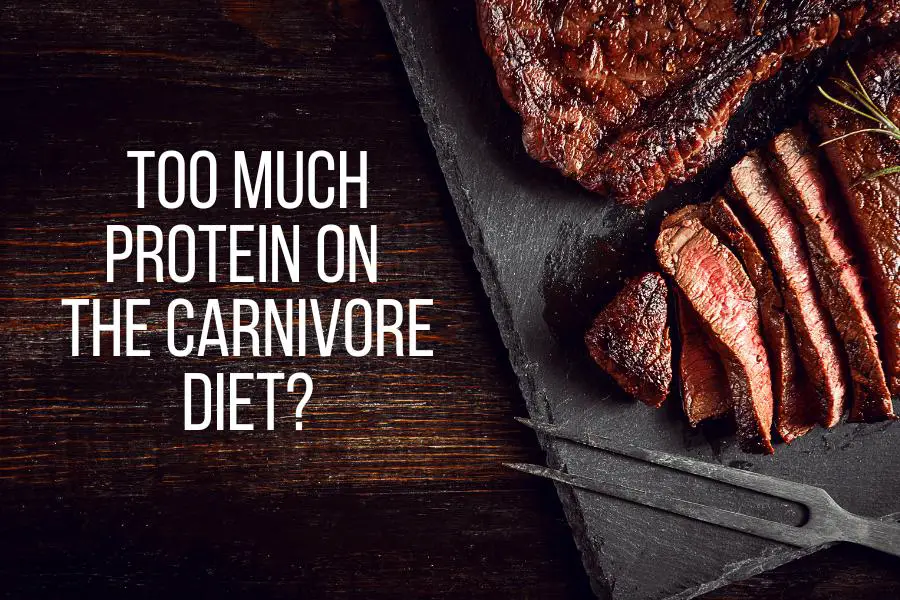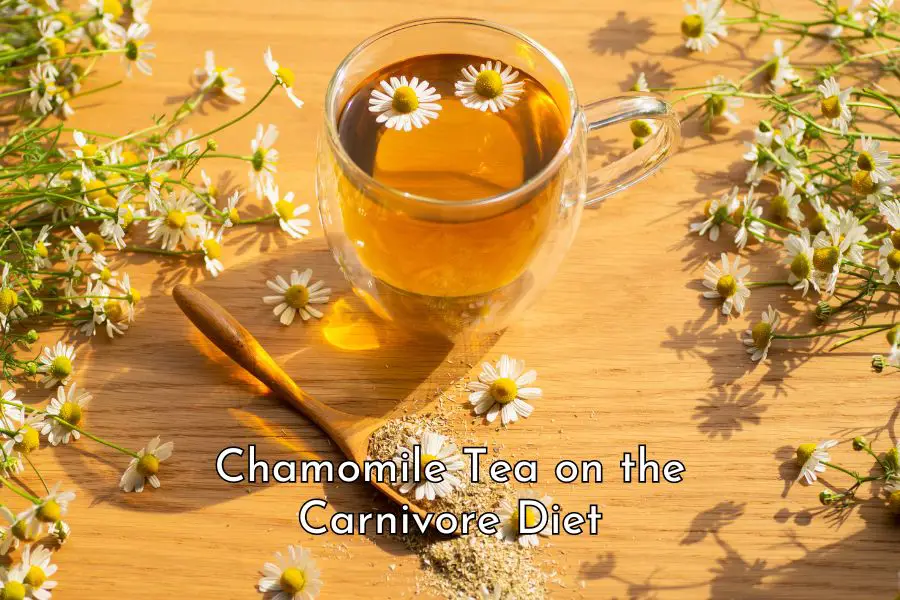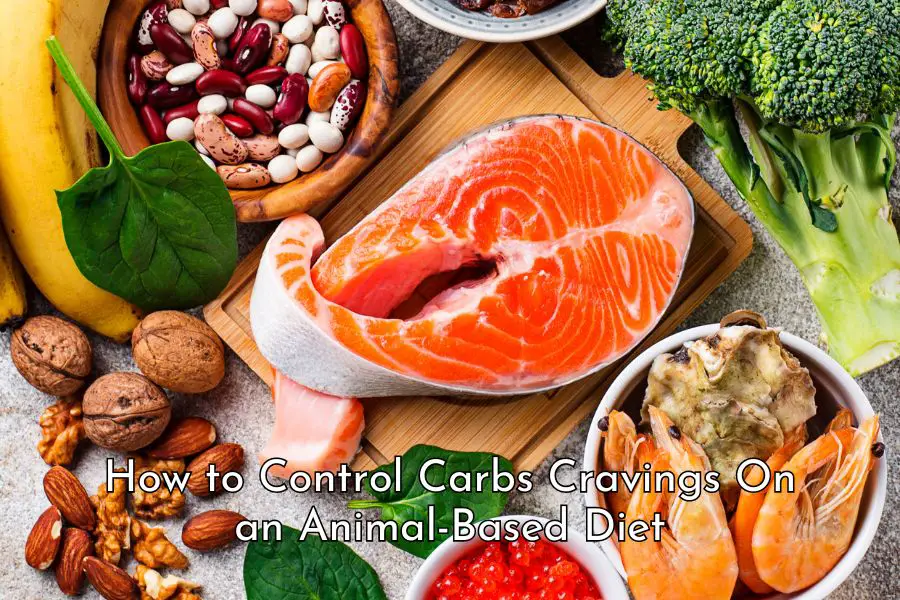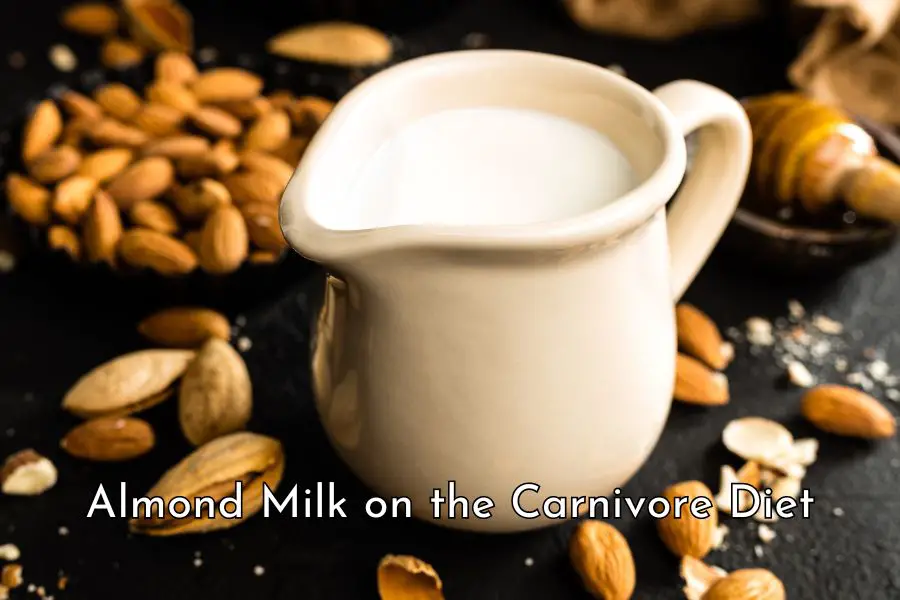Can you eat too much protein on the carnivore diet? The answer is a definite yes – you can eat too much protein and not enough fat on the carnivore diet if you are not aware of the importance of getting the fat-to-protein ratio right and only eat the average meat cuts from grocery stores.
This is because the average meat cuts from grocery stores are generally too lean, high in protein and low in fat. Just eating those will likely result in too much protein and not enough fat.
The typical meat cuts in grocery stores are like those in the pictures below: they are just muscle meat with very little visible fat.
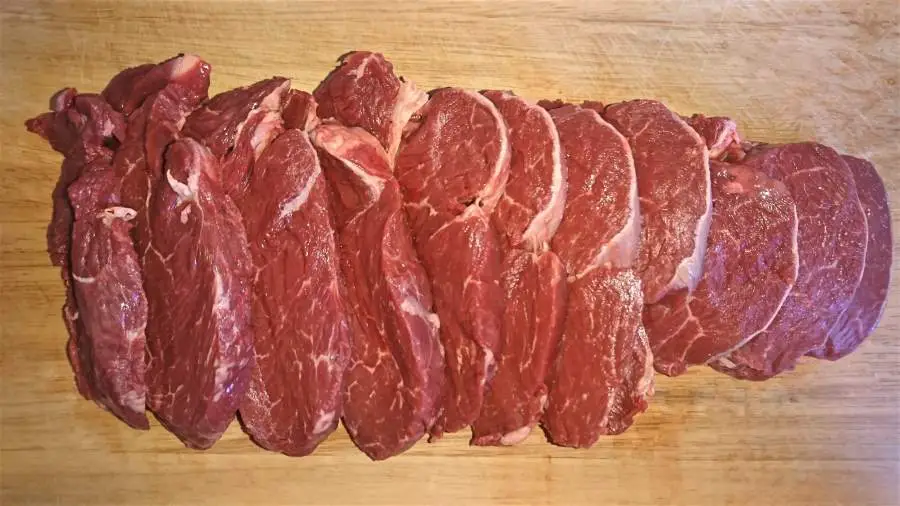
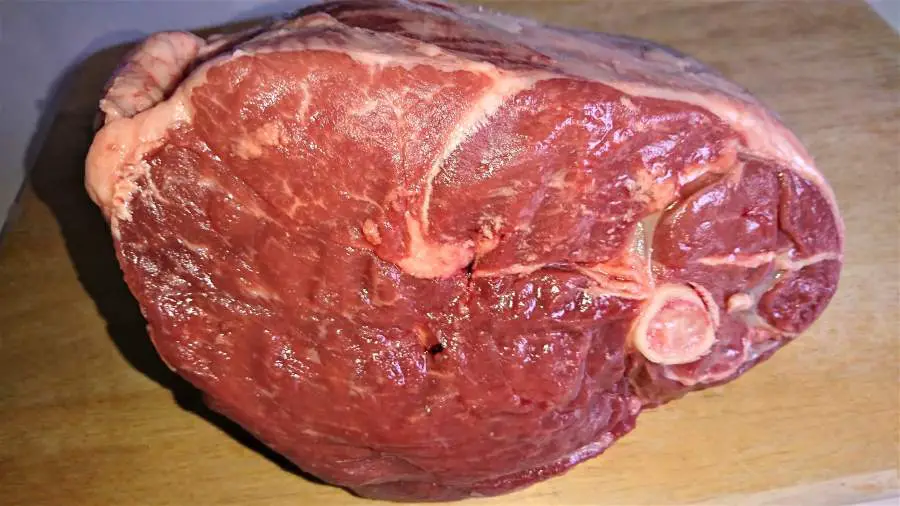
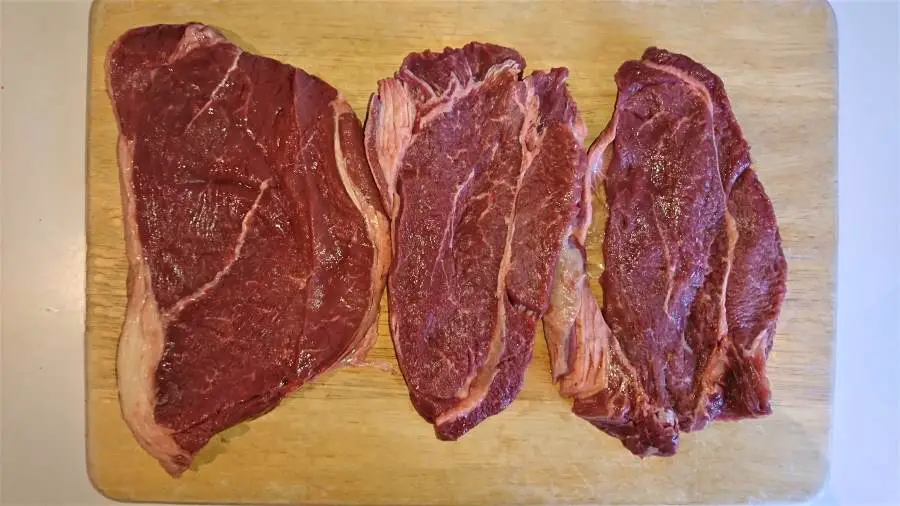
While our ancestors may have survived primarily on meat for millions of years, what they ate is likely to be very different from what we find in ordinary grocery stores today.
Due to the low-fat craze that emerged during the 1960s, became widespread in the 1980s, and reigned supreme in the late 1990s, consumers were led to believe that “fat is what makes us fat” and so fat was demonized. [1]
People shunned fat and food manufacturers gave us what we wanted: low-fat everything! Lean meat was in vogue and all visible fats were trimmed off.
With the growing body of solid evidence, some have come to realize that fat doesn’t make us fat but carbs do. However, the majority of the population remains oblivious to this fact and, as result, butchers still tend to trim off fat from meat, and lean meat cuts continue to be the norm today. [2, 3]
When I asked my local butchers if I could buy some beef fat to make tallow, I was given a bag of beef fat for free. The next time I came back to ask for some more beef fat and insisted on paying, I was given another bag for free because he said that he usually just binned it. I also suspect that he felt sorry for me, thinking that I couldn’t afford lean meat and was forced to survive on those fat trimmings that are not even fit for dog meat.
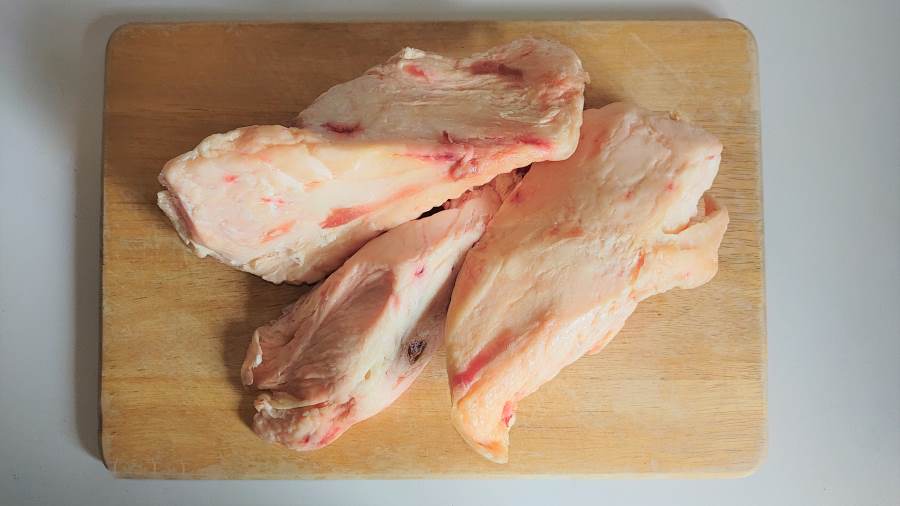
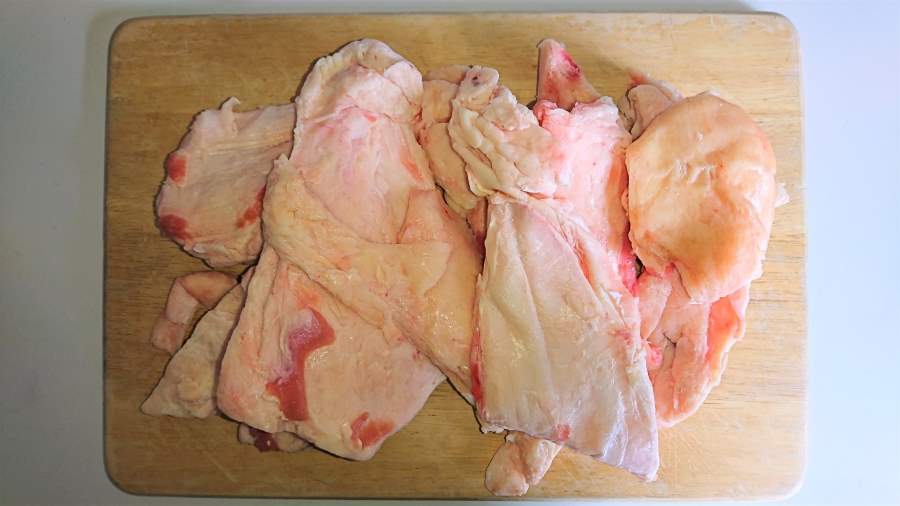
If the meats we buy from grocery stores haven’t had their fat trimmed off, I believe they would typically look like those offcuts below with a lot of visible fat. And if we eat meat cuts like these and truly eat nose-to-tail, we wouldn’t have to worry about eating too much protein or not eating enough fat.
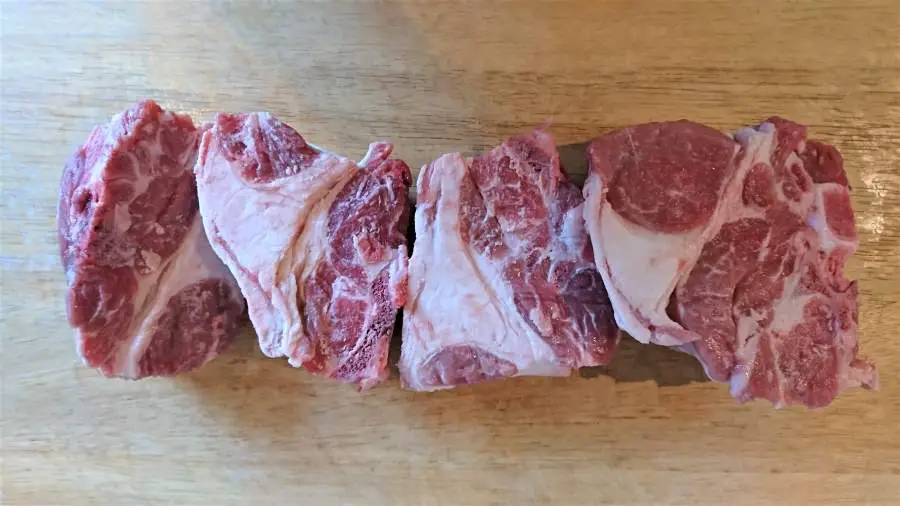
What happens if you eat too much protein?
If you eat a lot of protein and not enough fat, you would generally feel unwell, hungry and unsatiated. If you eat way too much protein and very little fat or carbs, you may suffer from protein toxicity which is sometimes referred to as “rabbit starvation”. [4]
The term “rabbit starvation” refers to the fact that if one has to live on an abundance of rabbit meat, one will starve and eventually die.
This is because rabbit meat is extremely lean and very high in protein. In a 100-gram serving of rabbit meat, there are 33 grams of protein, only 3.5 grams of fat and no carbs. You may eat as much rabbit meat as you want but you will still starve eventually because your liver has a limited capacity to deaminate proteins. [5, 6]
The human body’s ability to convert protein to energy is estimated to be about 35% to 50% of total energy intake. Going beyond this limit will begin to cause us trouble. Dangers of excessive protein include hyperaminoacidemia, hyperammonemia, hyperinsulinemia, nausea, diarrhea, and even death. [7, 8, 9, 10]
Vilhjalmur Stefansson, an Arctic explorer and anthropologist, who had spent many years living with the Inuit and survived on nothing but fish, noted the following.
If you are transferred suddenly from a diet normal in fat to one consisting wholly of rabbit, you eat bigger and bigger meals for the first few days until at the end of about a week, you are eating in pounds, three or four times as much as you were at the beginning of the week. By that time, you are showing both signs of starvation and of protein poisoning. You eat numerous meals; you feel hungry at the end of each; you are discomfort through distention of the stomach with much food and you begin to feel a vague restlessness. Diarrhoea will start in from a week to 10 days and will not be relieved unless you secure fat. Death will result after several weeks.
Vilhjalmur Stefansson (1944) in Arctic manual
The groups that depend on the blubber animals are the most fortunate, in the hunting way of life, for they never suffer from fat-hunger. This trouble is worst, so far as North America is concerned, among those forest Indians who depend at times on rabbits, the leanest animal in the North, and who develop the extreme fat-hunger known as rabbit starvation.
Rabbit eaters, if they have no fat from another source – beaver, moose, fish – will develop diarrhoea in about a week, with headache, lassitude, a vague discomfort. If there are enough rabbits, the people eat till their stomachs are distended; but no matter how much they eat they feel unsatisfied. Some think a man will die sooner if he eats continually of fat-free meat than if he eats nothing, but this is a belief on which sufficient evidence for a decision has not been gathered in the north. Deaths from rabbit-starvation, or from the eating of other skinny meat, are rare; for everyone understands the principle, and any possible preventive steps are naturally taken.
Vilhjalmur Stefansson in “Not by Bread Alone”
When Vilhjalmur Stefansson was put on a one-year of meat-only diet as an experiment in 1928 at Bellevue Hospital, they first fed him lean meat only with protein accounting for 44% of his total calorie intake. On the third day of this lean meat diet, he developed nausea and diarrhea. When fat meat was added to the diet, he fully recovered in 2 days but had a period of constipation lasting 10 days. [11]
How much protein do you need?
Your protein requirements depend on a number of factors including:
- Your nutritional status (e.g. how under-muscled or well-muscled you are)
- Your health goal (e.g. if you are treating epilepsy or using diet as a therapeutic way to manage cancer, you might be recommended to eat an extremely high-fat diet) [12, 13]
- Your body composition goal (e.g. if you want to improve muscle mass and weight-lift a lot, you may need a higher protein intake)
- What you eat (e.g. if you regularly eat nutrient-dense food like organ meat and are in a muscle-maintenance mode, you may not need a lot of lean meat in your diet).
There is a very wide range of recommended protein intake.
For example, the Institute of Medicine recommends 0.8 grams of protein per kg of body weight a day or 10% – 35% of total energy intake. Dr. Gabrielle Lyon, a functional medicine physician based in the US, believes that 0.8 grams per kg of body weight are the minimum level to prevent deficiency and that we should be eating 1.2 to 1.6 grams per kg of body weight. [14, 15, 16]
The International Society of Sports Nutrition is of the view that 1.4 – 2.0 g/kg/day for physically active individuals is not only safe but may improve performance. However, there is also evidence that healthy and well-adapted individuals can handle 3.5 g/kg/day which is more than 4 times the RDA set by the Institute of Medicine. [17, 18]
In summary, you can consume between 0.8 to 3.5 grams of protein per kg of body weight but no more than 35% to 50% of total energy intake should come from protein. [19, 20, 21]
How to avoid eating too much protein on the carnivore diet?
To avoid eating too much protein on the carnivore diet, get an estimate of your daily protein requirement either as a percentage of total calorie intake or as grams per pound of ideal body weight and then fill the rest of your calorie requirement with quality animal fat.
Estimating maximum protein intake based on total calorie intake
For example, if your daily calorie requirement is around 2000 calories, you should get no more than 35%-50% or 700 to 1000 calories from protein. This converts to a maximum of 175 to 250 grams of protein maximum.
Remember, however, this is the upper limit. Many people on the carnivore diet report feeling best on 20% to 30% of calories from protein and the rest from fat. This would translate to around 100 to 150 grams of protein a day.
Estimating maximum protein intake based on grams per pound of body weight
For example, if you weigh 70kg (174 lb) and you are a fairly active individual aiming to eat 2g of protein per kg of body weight to increase muscle mass, your daily protein intake will be around 140 grams.
If you are aiming to maintain your muscle mass and go for the lower end of the range of just 1 gram of protein per kg of body weight, you will be consuming about 70 grams of protein a day.
With one pound of average meat cut (e.g. tenderloin, strip steak, round tip, chuck steak) having about 100 grams of protein, you will be eating between 11 oz to 1.4lb of meat a day and fill up the rest of your energy requirements with fat.
Conclusion
Protein plays critical roles in the human body including serving as structural support to cells and tissues, catalyzing biochemical reactions, acting as hormones, and regulating the immune system. People on the carnivore diet are unlikely to have concerns that they are not getting enough of this critical nutrient. However, excessive protein intake is not good for your health either.
To make sure you don’t eat too much protein on the carnivore diet, work out approximately how much protein you need to consume in a day and then fill up the rest of your calorie requirements with quality animal fat.
If you don’t like to track macros on the carnivore diet, don’t worry too much. Listen to your own body’s signals, eat what makes you feel good, and stop eating when you no longer enjoy it.
Protein is generally self-limiting, meaning it is difficult to overeat. In my personal experience, I have found it difficult to eat too much protein as you cannot force-feed yourself beyond a certain point. You also cannot force-feed yourself too much fat either.
You will find that if you are eating too much protein, you will find fatty meat cuts very delicious and gravitate toward them over time and vice versa.
If you find that you need to add more fat to your diet, check out this post for some healthful tips.
Other posts you might be interested in:
Is Carnivore Diet + Fruit & Honey a Good Idea?
Can You Get Fat on the Carnivore Diet?
Best Sources of Omega 3 on the Carnivore Diet
How Long Does It Take to See Results on the Carnivore Diet?
How Much Organ Meat Should You Eat on the Carnivore Diet?
Do You Need Supplements on the Carnivore Diet?
What Do Hardcore Carnivores Eat in a Day?
Disclaimer: The information in this post is for reference purposes only and is not intended to constitute or replace professional medical advice. Please consult a qualified medical professional before making any changes to your diet or lifestyle. Please check out our disclaimer for more detail.

